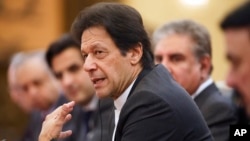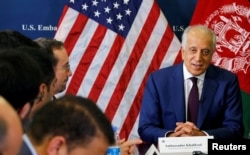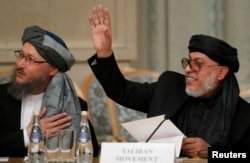The United States said Saturday it welcomes actions Pakistan is taking to promote a negotiated solution to the war in neighboring Afghanistan.
The acknowledgement came a day after Pakistani Prime Minister Imran Khan announced his country has arranged another round of Washington’s peace talks with the Afghan Taliban scheduled for Monday.
“The United States welcomes any actions by the Pakistani government to promote greater cooperation, including fostering negotiations between the Taliban, the Afghan government, and other Afghans,” a U.S. embassy spokesperson in Kabul told VOA.
US negotiator
U.S. special representative for Afghanistan reconciliation, Zalmay Khalilzad, has met, and will continue to meet, with all interested parties, including the Taliban, to support a negotiated settlement to the conflict in Afghanistan, the spokesperson added.
Neither Khan nor the U.S. spokesperson have disclosed the possible venue for the upcoming meeting with Taliban officials.
Some Afghan sources say Monday’s meeting will take place in Islamabad, but no official confirmation is available.
Khalilzad, who is visiting regional countries to gather support for Afghan peace talks, is to lead the U.S. delegation in talks with insurgent representatives. This will not be the first time Khalilzad has met with the Taliban.
Since taking office in September, the special U.S. envoy has held two publicly known rounds of preliminary discussions with insurgent negotiators in Qatar, where the Taliban runs its so-called political office. The talks have been for the sake of talks, according to insurgent and other sources aware of the meetings.
Trump’s letter to Khan
U.S. President Donald Trump earlier this month wrote a formal letter to Khan asking for his help to bring the Taliban to the table for negotiations. A day later, Khalilzad visited Islamabad where he met with Khan and his military chief, General Qamar Javed Bajwa, to follow-up on Trump’s request, Pakistani officials say.
Speaking in northwestern city of Peshawar on Friday, Khan said the U.S. has changed its tune by requesting help instead of saying Islamabad is not doing enough, as U.S. officials have previously insisted.
“By the grace of Allah, the dialogue is now happening inshallah [God willing] on the 17th [Khan did not mention the month] and Pakistan has facilitated the talks between America and the Taliban,” Khan said. He did not share further details.
Khan recounted Friday that critics used to mock him as “Taliban Khan” for saying the Afghan war could not be ended without political negotiations but now all key stakeholders are jointly working to pursue a political settlement to end the violence in Afghanistan.
“If peace were achieved, God willing, Peshawar will change and become a hub of commerce and tourism, as things around the 2,500 years old living city are likely to change,” Khan said Friday.
Ambassador Khalilzad is 13 days into an 18-day visit to the region. He has traveled to Pakistan, Afghanistan, Russia, Turkmenistan, Uzbekistan and Belgium and plans to visit the U.A.E. and Qatar.
Withdrawal an issue
Pakistani officials privy to the U.S. interaction with the Taliban have told VOA that until now no progress has been achieved because the insurgents adamantly demand “a date or timeframe” for all foreign troops to withdraw from Afghanistan before the Taliban decides to participate in an intra-Afghan peace process.
U.S. officials have long maintained Taliban leaders are sheltering in Pakistan with covert support from the country’s intelligence agency. Washington has been urging Islamabad to use its influence to bring the insurgents to the negotiating table.
Pakistani officials say their influence over the Taliban has significantly declined over the years because the insurgents have gained control over large areas of Afghanistan and continue to pose serious battlefield challenges for U.S.-backed Afghan security forces.






